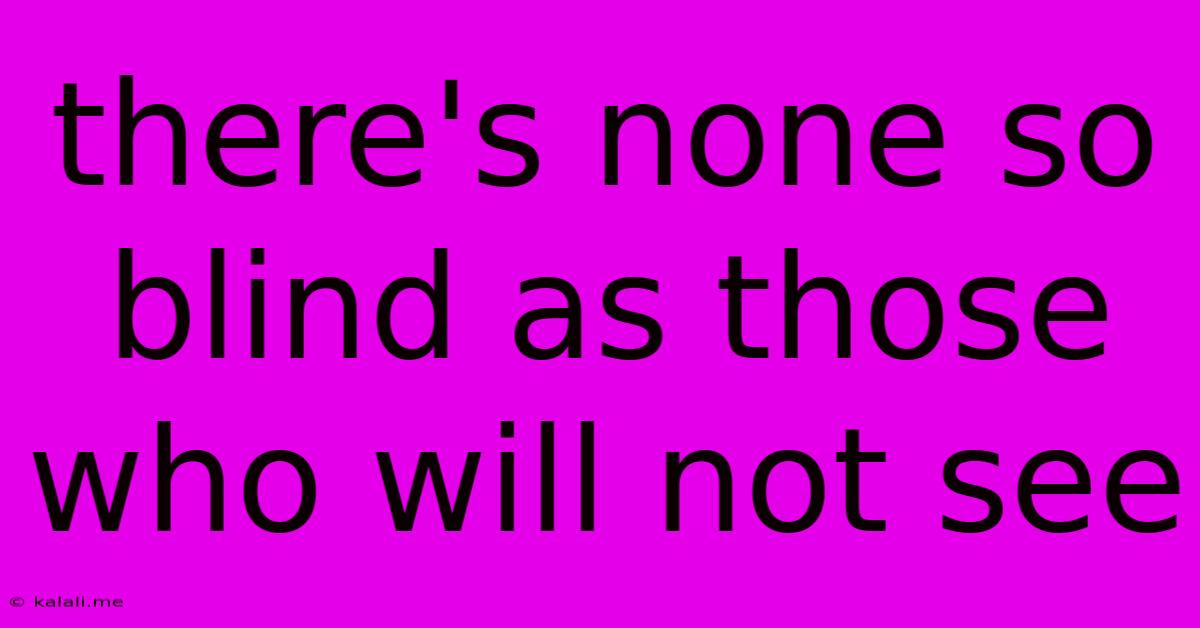There's None So Blind As Those Who Will Not See
Kalali
Jun 07, 2025 · 3 min read

Table of Contents
There's None So Blind As Those Who Will Not See: Understanding Willful Blindness
The proverb "There's none so blind as those who will not see" speaks volumes about the human condition. It highlights the self-imposed limitations we face when we refuse to acknowledge uncomfortable truths, inconvenient realities, or perspectives that challenge our pre-conceived notions. This isn't simply about a lack of physical sight; it's about a profound intellectual and emotional blindness – a willful turning away from the truth. This article explores the various facets of this willful blindness, its causes, and its consequences.
What is Willful Blindness?
Willful blindness, also known as deliberate ignorance, is the conscious avoidance of facts or information that might lead to uncomfortable conclusions. It's not merely a failure to see; it's an active decision not to see, a deliberate choice to remain ignorant even when confronted with evidence. This is distinct from accidental ignorance or simple oversight. It involves a conscious effort to avoid facing reality. This type of blindness manifests in many areas of life, from personal relationships to global politics.
Causes of Willful Blindness:
Several factors contribute to willful blindness:
- Cognitive Dissonance: When new information conflicts with pre-existing beliefs, it can create cognitive dissonance – a feeling of mental discomfort. To alleviate this discomfort, individuals may choose to ignore or dismiss the conflicting information, maintaining their existing beliefs even in the face of evidence to the contrary.
- Emotional Attachment: Strong emotional attachments to certain beliefs, ideologies, or people can cloud judgment and lead to willful blindness. The desire to protect these attachments outweighs the need for objective truth.
- Confirmation Bias: This is the tendency to search for, interpret, favor, and recall information in a way that confirms or supports one's prior beliefs or values. It actively filters out contradictory information, reinforcing willful blindness.
- Fear of Consequences: Acknowledging uncomfortable truths can have personal or social consequences, such as losing social standing, facing criticism, or experiencing emotional distress. The fear of these consequences can lead individuals to avoid confronting the truth.
- Power and Privilege: Individuals in positions of power may be more likely to engage in willful blindness to protect their status quo. This can involve ignoring injustices, unethical practices, or environmental damage that might threaten their authority or wealth.
Consequences of Willful Blindness:
The consequences of willful blindness can be significant and far-reaching:
- Missed Opportunities: Ignoring valuable information can lead to missed opportunities for personal growth, professional success, or positive social change.
- Poor Decision-Making: Decisions based on incomplete or inaccurate information are likely to be flawed, leading to negative outcomes.
- Escalation of Problems: Ignoring problems only allows them to worsen, potentially leading to catastrophic consequences. This is particularly relevant in areas like climate change or public health crises.
- Damaged Relationships: Willful blindness can severely damage relationships, leading to mistrust and resentment.
- Social Injustice: Willful blindness to systemic inequalities perpetuates injustice and prevents meaningful progress towards a more equitable society.
Overcoming Willful Blindness:
While challenging, overcoming willful blindness is possible. It requires self-awareness, intellectual honesty, and a commitment to seeking truth, even when it's uncomfortable. Strategies include:
- Cultivating Critical Thinking Skills: Learning to analyze information objectively, identify biases, and evaluate evidence critically is crucial.
- Seeking Diverse Perspectives: Actively seeking out and engaging with perspectives that challenge your own can broaden your understanding and help you see beyond your own biases.
- Practicing Mindfulness: Being present and attentive to your thoughts and feelings can help you recognize when you're avoiding uncomfortable truths.
- Embracing Discomfort: Acknowledging that facing uncomfortable truths can be painful, but necessary for growth and progress.
In conclusion, "There's none so blind as those who will not see" serves as a powerful reminder of the importance of self-reflection, intellectual honesty, and the pursuit of truth. By understanding the causes and consequences of willful blindness, we can strive to overcome this self-imposed limitation and create a more informed and equitable world.
Latest Posts
Latest Posts
-
Should You Use Your Sitename In Keywords Seo
Jun 07, 2025
-
How To Remove Broken Wheel Nut
Jun 07, 2025
-
Will He Find Faith On The Earth
Jun 07, 2025
-
Through Me For A Loop Meaning
Jun 07, 2025
-
How To Delte Everything After Double Barline Sibleius
Jun 07, 2025
Related Post
Thank you for visiting our website which covers about There's None So Blind As Those Who Will Not See . We hope the information provided has been useful to you. Feel free to contact us if you have any questions or need further assistance. See you next time and don't miss to bookmark.